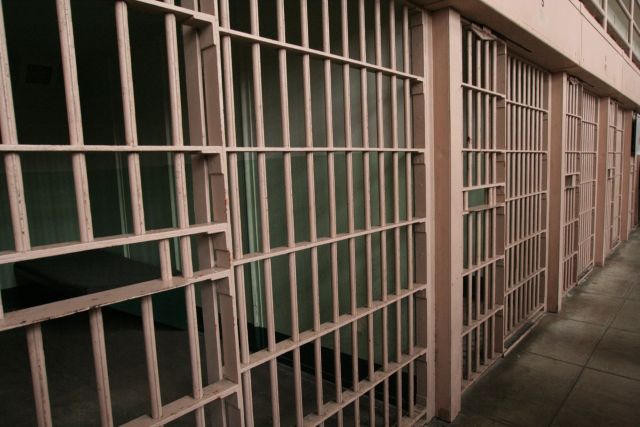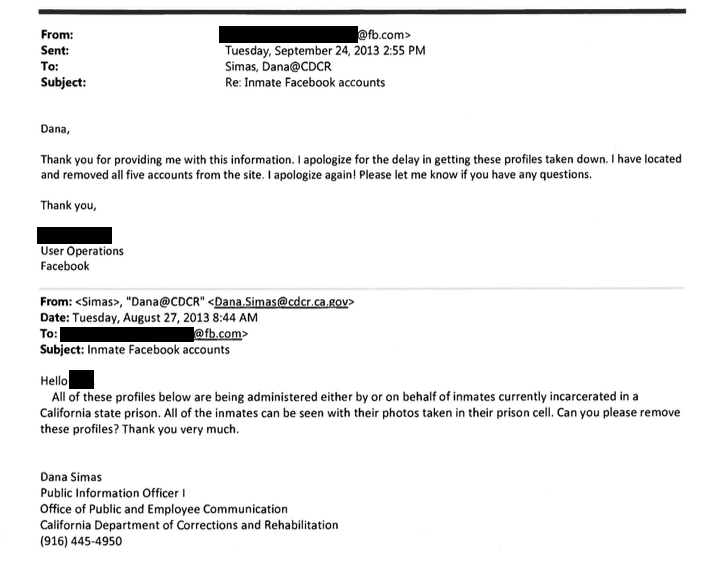Internet behind bars: Texan prisoners banned from Facebook and Twitter
You were imprisoned.
For some, this may sound worse than you died from an article on online life after death , in which we talked about setting up accounts in case of a sudden death. Is it possible to publish something from prison? The Texas Department of Criminal Justice has updated the Handbook of Violations of Prisoners and made it a rule prohibiting the update of pages on social networks. This also applies to the records that their relatives leave behind the convicts.
Let's discuss how correctly to prohibit prisoners to post something on social networks, and how they use the Internet in the US and Russia.
')

Inmates in Texas do not have access to the Internet, that is, formally, they themselves can not publish anything in social networks. Instead, they use regular mail to send messages to family members and friends to post to Facebook. But now, if the prison staff learns that someone is driving the prisoner's page on the social network, this prisoner will be assigned a violation of the lowest, third level.
According to the Electronic Frontier Foundation, such a violation could mean the loss of privileges, additional work, or the continued presence in the cell for up to 45 days. Therefore, the Foundation sent a letter to the authorities demanding the abolition of the rule, arguing that this was a violation of the First Amendment. This amendment guarantees that the US Congress will not:
That is, the Foundation considers this rule to violate the freedom of speech and the right of the people to appeal to the Government with complaints.
Government spokesman Jason Clark (Jason Clark) in a letter to Ars Technica noted that the new rules do not apply to posts prisoners in blogs. This rule is made specifically for active accounts in social networks such as Facebook, Twitter and Instagram. These companies have mechanisms to make a request to deactivate pages, but without legal justification for the requirements, social networks refuse to do so. Now, thanks to the new norm, the social networks will listen to the requests of the penitentiary system.
In June 2015, correspondence between Facebook and prisons, through which a social network blocked accounts of prisoners, got into the Electronic Frontier Foundation. Facebook refuses to comment on this issue. If this is true, then it goes against the words of Mark Zuckerberg: "I consider the connection to be the right person, and together we can make it a reality."
Other US states already have similar rules. For example, in Alabama, prisoners are prohibited from using any site that allows you to make a personal profile or “offers a mechanism for communication between users, such as a forum, chat, email, or instant messages.” In Maine, you can't have personal blogs, and in South Carolina, people caught on Facebook are sent to solitary confinement as a punishment.

To find out whether prisoners in Russia are allowed to use the Internet, I searched for the answer to Answers.Mail.ru.

But seriously, according to Russian law, it is not possible to use the Internet and mobile communications in the SIZO, nor in the colonies, or in prisons. Imprisonment itself as a form of criminal punishment implies isolation of a criminal from society. If communication with society remains, for example, through social networks, then the punishment is meaningless. It is surprising that this also applies to settlement colonies, where convicts can move outside the colony’s territory, have a job and sometimes even live with their families.
But this did not prevent the head of the correctional colony of the Arkhangelsk region from abusing his authority and getting more than two million rubles for prisoners for using the Internet.
Mobile fraud continues to flourish. Despite the fact that a convicted person’s phone in the colonies cannot be used, it is impossible to keep track of compliance with this rule physically. This is complemented by problems in finding employment while serving a sentence. One of the ways to get money from unsuspecting citizens is mobile fraud related to the find sites.
The attackers find an ad that says about the missing smartphone or documents, call, ask to transfer money to the account and disappear. Under the link is an article in which the journalist checked this method on herself and wrote down the numbers of eight scammers who allegedly wanted to return the lost gadget. Almost all of these numbers were from the same region - Altai Territory, the city of Rubtsovsk. In this city, in addition to the SIZO, there is a strict regime colony for 1,800 people, a general regime colony for 2,000 people, a women's correctional colony for 1,000 people and a number of other correctional institutions. From this we can conclude exactly who worked in this case.
For some, this may sound worse than you died from an article on online life after death , in which we talked about setting up accounts in case of a sudden death. Is it possible to publish something from prison? The Texas Department of Criminal Justice has updated the Handbook of Violations of Prisoners and made it a rule prohibiting the update of pages on social networks. This also applies to the records that their relatives leave behind the convicts.
Let's discuss how correctly to prohibit prisoners to post something on social networks, and how they use the Internet in the US and Russia.
')

Inmates in Texas do not have access to the Internet, that is, formally, they themselves can not publish anything in social networks. Instead, they use regular mail to send messages to family members and friends to post to Facebook. But now, if the prison staff learns that someone is driving the prisoner's page on the social network, this prisoner will be assigned a violation of the lowest, third level.
According to the Electronic Frontier Foundation, such a violation could mean the loss of privileges, additional work, or the continued presence in the cell for up to 45 days. Therefore, the Foundation sent a letter to the authorities demanding the abolition of the rule, arguing that this was a violation of the First Amendment. This amendment guarantees that the US Congress will not:
- To support any religion, or to approve the state religion.
- Prohibit free worship.
- Impinge upon free speech.
- To encroach on freedom of the press.
- Restrict freedom of assembly.
- To limit the right of the people to appeal to the Government with petitions for the settlement of complaints.
That is, the Foundation considers this rule to violate the freedom of speech and the right of the people to appeal to the Government with complaints.
Government spokesman Jason Clark (Jason Clark) in a letter to Ars Technica noted that the new rules do not apply to posts prisoners in blogs. This rule is made specifically for active accounts in social networks such as Facebook, Twitter and Instagram. These companies have mechanisms to make a request to deactivate pages, but without legal justification for the requirements, social networks refuse to do so. Now, thanks to the new norm, the social networks will listen to the requests of the penitentiary system.
In June 2015, correspondence between Facebook and prisons, through which a social network blocked accounts of prisoners, got into the Electronic Frontier Foundation. Facebook refuses to comment on this issue. If this is true, then it goes against the words of Mark Zuckerberg: "I consider the connection to be the right person, and together we can make it a reality."
Other US states already have similar rules. For example, in Alabama, prisoners are prohibited from using any site that allows you to make a personal profile or “offers a mechanism for communication between users, such as a forum, chat, email, or instant messages.” In Maine, you can't have personal blogs, and in South Carolina, people caught on Facebook are sent to solitary confinement as a punishment.

To find out whether prisoners in Russia are allowed to use the Internet, I searched for the answer to Answers.Mail.ru.

But seriously, according to Russian law, it is not possible to use the Internet and mobile communications in the SIZO, nor in the colonies, or in prisons. Imprisonment itself as a form of criminal punishment implies isolation of a criminal from society. If communication with society remains, for example, through social networks, then the punishment is meaningless. It is surprising that this also applies to settlement colonies, where convicts can move outside the colony’s territory, have a job and sometimes even live with their families.
But this did not prevent the head of the correctional colony of the Arkhangelsk region from abusing his authority and getting more than two million rubles for prisoners for using the Internet.
Mobile fraud continues to flourish. Despite the fact that a convicted person’s phone in the colonies cannot be used, it is impossible to keep track of compliance with this rule physically. This is complemented by problems in finding employment while serving a sentence. One of the ways to get money from unsuspecting citizens is mobile fraud related to the find sites.
The attackers find an ad that says about the missing smartphone or documents, call, ask to transfer money to the account and disappear. Under the link is an article in which the journalist checked this method on herself and wrote down the numbers of eight scammers who allegedly wanted to return the lost gadget. Almost all of these numbers were from the same region - Altai Territory, the city of Rubtsovsk. In this city, in addition to the SIZO, there is a strict regime colony for 1,800 people, a general regime colony for 2,000 people, a women's correctional colony for 1,000 people and a number of other correctional institutions. From this we can conclude exactly who worked in this case.
Source: https://habr.com/ru/post/393077/
All Articles